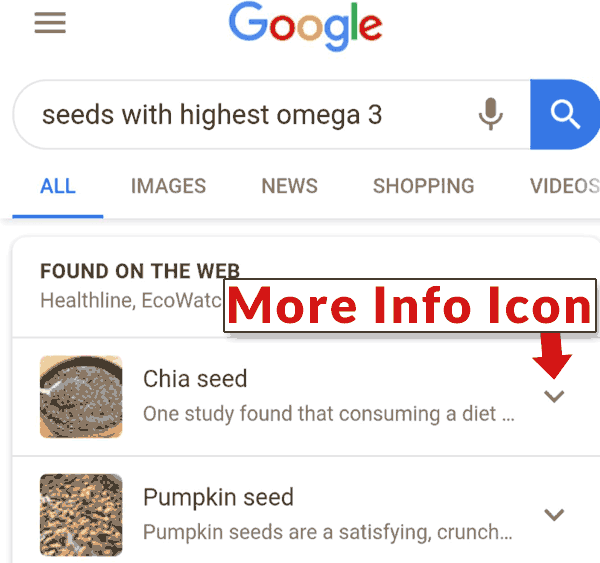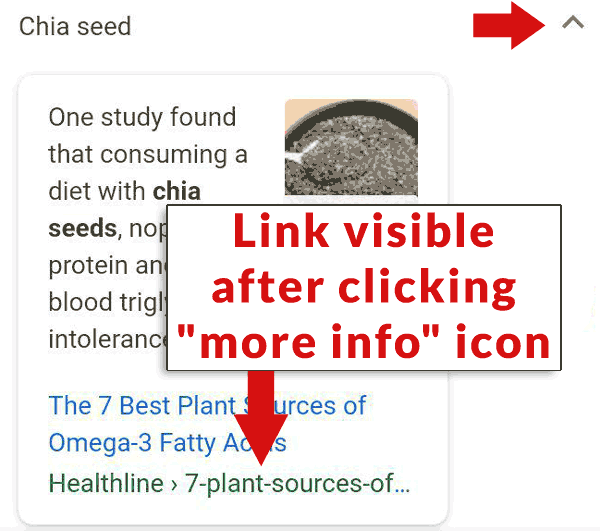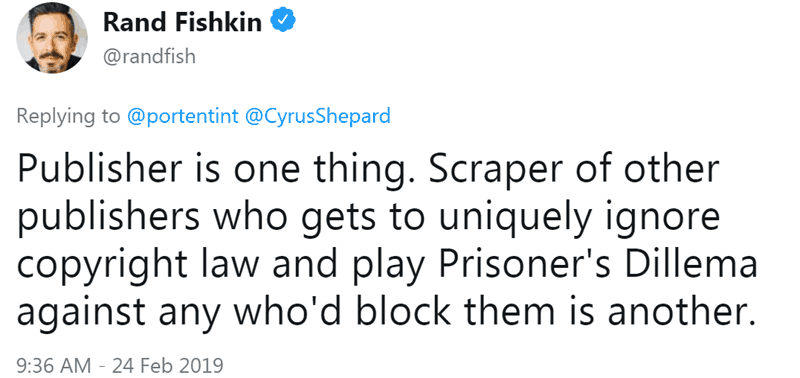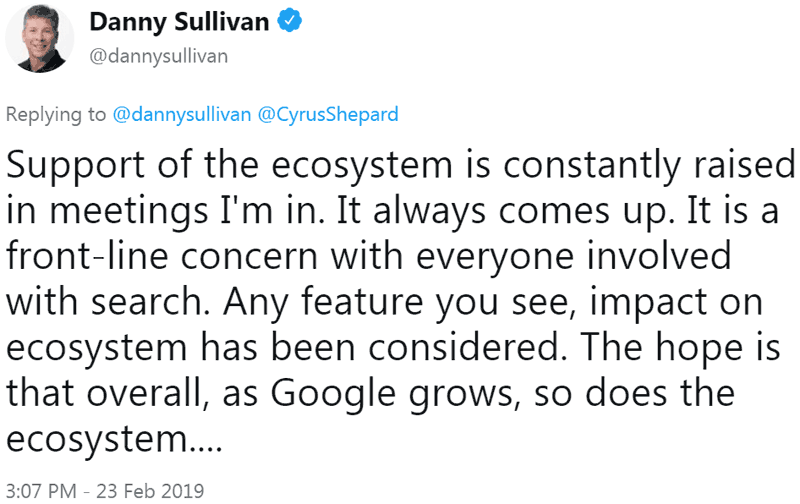Search marketing consultant Cyrus Shepard tweeted about a featured snippet with zero links back to the websites from which the information came from. Several in the SEO community compared Google to scrapers.
The sentiment on Twitter about the unlinked featured snippet was less than positive. Google’s Danny Sullivan responded with an explanation of the featured snippets and offered to bring publisher concerns back to Google.

Unlinked Featured Snippets
In these kinds of featured snippets, Google makes it difficult to click through to the site from where Google indexed the information.
The unlinked featured snippet displays a small triangular icon that has no label to identify what it is for.

Once clicked, the website information becomes visible. The icon is small and not everyone may understand that it represents “more information.”

SEOs contributed observations, with Ian Lurie of Portent tweeting that this is evidence of Google’s transformation into a publisher.
“I’ve said it before: Google is becoming a publisher. If you’re a competing publisher, I suggest diversifying into fast food franchises.”
Rand Fishkin, in a passionate tweet, invoked the image of a scraper that violates copyrights.
 Another Twitter member tweeted that it was the death of web publishers:
Another Twitter member tweeted that it was the death of web publishers:
“This is the death of publishers as Google scrapes all their content and no one visits their sites.”
Danny Sullivan Affirms Google’s Commitment to Publishers
That’s when Google’s Danny Sullivan stepped to give a strong affirmation that Google cares about the publisher ecosystem and that this is a major concern for Google.
Here is what Danny Sullivan tweeted:
Since I got asked about this, a couple of things.
Most important, the future of Google Search is to continue supporting the ecosystem. We don’t thrive & users don’t thrive unless the ecosystem thrives.
I wrote about this last year….
https://t.co/S7Es57l7fW
Danny then followed up by giving an inside look at how the concern over sustaining the publisher “ecosystem” is a top priority in meetings he has attended.
Support of the ecosystem is constantly raised in meetings I’m in. It always comes up. It is a front-line concern with everyone involved with search. Any feature you see, impact on ecosystem has been considered. The hope is that overall, as Google grows, so does the ecosystem….

Danny Sullivan then tweeted that search is always evolving and encouraged SEOs to view these as opportunities and not obstacles.
For everyone to grow, search has to keep evolving. While I think SEOs are fair to raise concerns about new formats, I also think they should recognize that new formats bring in new and often welcomed opportunities. Which leads back to this particular feature….
A feisty discussion continued, with a Twitter member noting there was no attribution or link and compared unlinked featured snippets to plagiarism.
“If I take the copy of a webpage and serve it up without attribution that’s plagiarism. If Google does it that’s “supporting the ecosystem””
“I will pass along the concern that it might be better if these showed a link for the first site being quoted or perhaps the carousel was opened for the first listing.”
That response received a positive response, with this tweet by Thom Craver being representative of the general mood:
“That would be ideal. Google has always wanted sites to link out to sources to help the user experience. SEO’s linked out because it was right for the users (leading to a LOT of nofollow links). Google should certainly follow the guidance they gave us all years ago.”
Why the SEO Community is Upset over Unlinked Featured Snippets
There is a perception that Google encourages publishers to create quality content only to turn around and use it without benefit to the publisher.
The use of publisher content without proper attribution may feel like a violation of the tacit understanding between Google and publishers that both thrive when it’s a mutually beneficial ecosystem.
Birds and insects harvest sustenance from plants and the plants benefit from having their species propagated by that action. That mutually beneficial give and take is how ecosystems work.
For Google to use publisher data without a link goes against the essential quality of an ecosystem wherein all parties benefit.
The fact that there are liaisons between Google and publishers is evidence that Google understands that Google’s success depends on the vitality of the publishing community. Danny Sullivan’s response appears to have given publishers hope that the ecosystem may return to a more equitable balance.
Read the Twitter discussion here.
More Resources
- Google Tests Double Featured Snippets
- A Complete List of the Different Types of Featured Snippets
- 9 Tips on How to Rank for Featured Snippets
- How to Get Featured Snippets on Google: A Quick Start Guide
- Optimize Your Site for Featured Snippets
Screenshots by Author, Modified by Author


